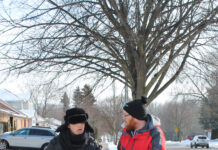Gov. Gen. David Johnston was at UW Oct. 30 to help inaugurate two new additions to the UW campus. </p>
Starting at UW’s north campus, Johnston, accompanied by his wife Sharon, first addressed an audience at the Centre of Excellence for Innovation in Aging (CEIA), then proceeded to Renison University College, where they celebrated the official opening of the building’s new extension.
CEIA’s primary focus is on enhancing geriatric studies, addressing and anticipating the needs of Canada’s growing aging population. While a part of UW, this facility was made in partnership with Schlegel Villages, Conestoga College, and the Research Institute for Aging (RIA). CEIA is a combination of a live-in long-term care facility and research space.
While president of UW from 1999-2010, Johnston played a significant role in initiating this project.
“[Johnston] was very enthusiastic. He’s been a champion since day one. That’s his role. So it was really fortuitous that he was able to fit it into his schedule,” said Dr. Mike Sharratt, the president of the Schlegel-UW RIA. Sharratt later described Johnston as an advocate for the project, adding on that the CEIA, in its early stages, was an initiative to further develop UW’s life sciences presence in the community.
In his speech at CEIA, Johnston explained that this will be the first time in Canadian history where the senior population — those 65 years of age or older — will exceed the youth population of 15 or younger. Greater geriatric research is becoming mandatory for Canada.
“The population proportions are shifting in the next 20 years or so…. With that large number of people, as they get older there definitely will be need for heavier care,” said Sharratt. “Even now, there’s long waiting lists for long-term care, and so this was an important addition to this [region] as well. That’s why we got approval to do this in the first place, because Kitchener-Waterloo is underserved in terms of long-term care.” This facility is particularly unique as it will facilitate a long-term care community while also conducting research.
Renison’s extension, which costed approximately $9 million dollars, includes 14 new classrooms, doubling the total number of classrooms in the building. This addition came primarily as a response to the growth of enrolment within Renison’s English Language Institute (ELI). Since the faculty of math has decided to remove the ELPE requirement from its curriculum and replace it with English language learner courses, Renison’s English for Multilingual Speaker Program has doubled. With this new extension, the ELI was able to gain a new office as well as have access to more study spaces.
In addition to the Multilingual Speaker Program, Renison is home to a variety of language and culture programs including Islamic Studies, East Asian Studies, Japenese, Arabic, and Chinese language clasess.
During his speech, Johnston described Renison as a space focused on “social and global engagement.” Johnston also explained how the new addition will work to further Canada’s diversity. In an anecdote about his five daughters’ experiences with international education, Johnston mentioned that diversity in education actively develops “qualities of curiosity, tolerance, judgment, and empathy” — factors of education Johnston finds are necessary to the functioning of a heathy society.
“The grasp of languages and cultures is essential to our success in our world today,” said Johnston, later adding, “This new building is a beacon for global engagement through languages and cultures and I’m inspired to think of the learning that will continue to take place here.”































